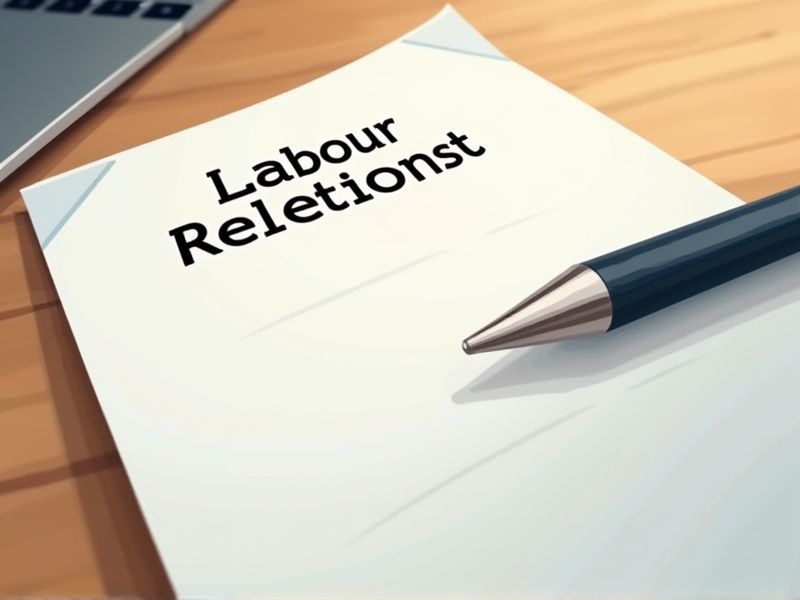
Labour Relations Specialists navigate complex interactions between management and employees, mediating negotiations and resolving conflicts. Certification equips these specialists with critical knowledge of labor laws and negotiation techniques, ensuring they effectively manage workplace disputes. Many employers prefer certified professionals as it demonstrates commitment and expertise in handling sensitive labor relations issues. Key certifications for a Labour Relations Specialist are vital to showcasing their proficiency and credibility in the field.
Certified Labour Relations Specialist (CLRS)
A Certified Labour Relations Specialist (CLRS) provides a structured framework and standardized knowledge essential for effectively managing complex labor relations issues. With certification, specialists can demonstrate their competency, enhancing their credibility with both employers and unions. This certification ensures professionals stay updated with the latest labor laws and negotiation techniques, aiding in proactive conflict resolution. Businesses benefit from improved labor relations, reducing the risks of industrial disputes and fostering a collaborative workplace environment.
Professional in Human Resources (PHR)
A Professional in Human Resources (PHR) certification equips a Labour Relations Specialist with comprehensive knowledge of employment laws, ensuring legal compliance during negotiations. It enhances their understanding of organizational behavior, enabling them to mediate conflicts effectively between management and employees. The PHR designation attests to advanced skills in talent management, crucial for maintaining a productive and satisfied workforce. Certified professionals are often associated with strategic thinking capabilities, thus improving labor-management dialogue and decision-making.
Senior Professional in Human Resources (SPHR)
The SPHR certification equips a Labour Relations Specialist with advanced knowledge in strategic management and policy development, crucial for negotiating complex labor agreements. This credential signifies expertise in employment law and compliance, ensuring organizations remain aligned with evolving regulations and avoid costly disputes. Having an SPHR deepens understanding of organizational behavior and employee engagement, central for resolving conflicts and enhancing workplace harmony. Data from HR practices indicates that professionals with SPHR tend to implement more effective labor relations strategies, contributing to improved employee satisfaction and retention.
SHRM Certified Professional (SHRM-CP)
SHRM Certified Professional (SHRM-CP) enhances a Labour Relations Specialist's ability to navigate complex employment laws, improving compliance and reducing legal risks. Certification validates expertise in conflict resolution strategies, facilitating constructive negotiations between employers and employees. SHRM-CP provides a framework for understanding organizational behavior dynamics, essential for fostering a cooperative workplace. It strengthens credibility and professional trust, positioning specialists as authoritative figures in human resources management.
SHRM Senior Certified Professional (SHRM-SCP)
The SHRM-SCP provides a comprehensive understanding of advanced human resource strategies, which enhances a Labor Relations Specialist's ability to manage complex workforce issues. Certification confirms expertise in integrating HR functions with organizational goals, which is crucial for negotiating and maintaining effective labor agreements. The credential equips professionals with the necessary skills to interpret labor laws and regulations accurately, minimizing legal risks in labor relations. As organizations increasingly prioritize strategic alignment, a SHRM-SCP credential sets specialists apart, demonstrating their advanced proficiency in fostering productive employer-employee relationships.
Certified Employment Relations Professional (CERP)
Labor relations specialists often navigate complex legal frameworks and workplace issues, requiring specialized expertise for effective conflict resolution. A Certified Employment Relations Professional (CERP) designation provides validation of skills in managing these challenges, enhancing credibility and trust among employers and employees. With certification, specialists gain advanced knowledge in negotiation techniques and labor laws, improving their ability to mediate disputes successfully. CERP gives specialists a competitive edge in the workforce, facilitating career advancement and ensuring up-to-date practices in evolving labor environments.
Certified Union Negotiator (CUN)
Certified Union Negotiator status enhances a Labour Relations Specialist's credibility in bargaining scenarios, leading to more effective settlements. Accreditation ensures the specialist is well-versed in labor laws, minimizing legal risks for organizations. CUNs possess refined negotiation skills, crucial for resolving complex disputes and maintaining workplace harmony. Recognized certification often results in improved trust and communication between employees and management, fortifying organizational stability.
Mediation and Conflict Resolution Certification (MCRC)
Possessing a Mediation and Conflict Resolution Certification enhances a Labour Relations Specialist's ability to navigate complex disputes, leading to more effective conflict resolutions. Certification ensures specialists are equipped with proven strategies to facilitate negotiations and foster collaborative work environments. With certification, Labour Relations Specialists can build trust among stakeholders, creating a conducive atmosphere for dialogue. A certified specialist is more adept at identifying underlying issues in labor disputes, reducing the risk of prolonged conflicts.
Alternative Dispute Resolution Certification (ADR)
The ADR certification equips Labour Relations Specialists with skills to handle disputes without resorting to litigation, which reduces costs and time for organizations. This specialized training enhances the ability to create cooperative agreement environments, leading to better employer-employee relationships. By holding an ADR certification, Labour Relations Specialists can demonstrate credibility and proficiency in conflict resolution to employers and clients. The certification ensures that Specialists are up-to-date with current mediation and negotiation techniques, aligning with modern legal and workplace standards.
Labor Law and Industrial Relations Certification (LLI)
A Labor Law and Industrial Relations Certification (LLI) equips a Labour Relations Specialist with the essential knowledge to navigate complex employment laws, which reduces legal disputes and improves compliance. This certification enhances their ability to mediate between employers and employees, fostering healthier workplace relationships. Possessing an LLI ensures that specialists can effectively address union negotiations and collective bargaining processes with a solid foundational understanding. In a rapidly evolving labor market, certified specialists remain adept at adapting to regulatory changes, ensuring long-term organizational resilience.
Summary
You can anticipate improved credibility and expertise when a Labour Relations Specialist obtains certifications. This enhanced skill set can lead to more effective negotiation and conflict resolution within labor environments. Organizations may recognize these credentials and be more inclined to trust and rely on such specialists for complex labor issues. Overall, certifications can expand career opportunities and foster professional growth for the specialist.
